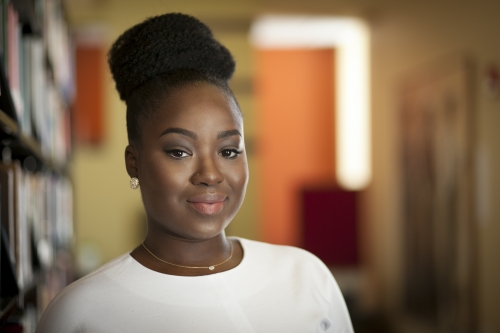"When we go out, the first thing that everyone sees is that we’re black. Our immigrant status comes second to that. When the police see you, first you’re black, and then when they hear you, it makes the situation worse. So I feel that we are part of it, and we also feel the pain."
This is filmmaker Nadia Sasso's Sierra Leonean mother, Siah Samba Sasso, speaking about how African immigrants experience life in America. While most daughters promoting their work wouldn't put their mom on the phone with a journalist, the 26-year-old often brings viewers behind the scenes in her subjects' lives and makes their culture-traversing experiences accessible for everyone.
Sasso's just-released “Am I: Too African To Be American Or Too American To Be African?" draws on candid interviews with first-generation West African-Americans—including, notably, “Awkward Black Girl” creator Issa Rae. The women talk about relating to peers of different backgrounds, the disconnect between their parents’ and American culture, and claiming their place in the American tapestry. "Am I," which is available for immediate streaming via its official website, has already been praised by the Huffington Post, OkayAfrica and Blavity.
Here, we talk to Sasso about the place African immigrants and their children inhabit in black American culture and activism as well as why the film’s stark portrayal of intra-racial conflict is necessary for audiences of all backgrounds to see.
Your film deals a lot with the simultaneous rejection that the children of African immigrants face from both their parents’ culture and what might be called "black American culture." Do you get a sense that immigrants and first-generation Americans like yourself and the women you interviewed see themselves and their culture as part of black America?
I personally think [African immigrants and their children] play a role. I think that, also, they’re understanding their role with America now being the place they live. For instance, I don’t have an accent or any of these things that society says is a mark of an immigrant, and the first thing people see is that I’m black. Therefore, I have to navigate that space as well. You cannot pretend that it doesn’t exist, especially if you’re living in low-income areas or communities of mostly people of color. It doesn't matter if you’re born here or in Africa—you’re going to face the same things that black Americans are facing.
Then do you see members of that recent diaspora playing a big role in contemporary activism around the Black Lives Matter movement?
I think the younger generation understands. I don’t think that the older generation doesn’t want to participate, they just don’t understand how to because there’s a cultural difference and a lack of education. I can tell you firsthand that I didn’t really learn about black consciousness until I was an undergrad at Bucknell University. That’s something I was not taught from elementary to high school or from my immigrant parents. That's not something [we] discussed at home because they didn't want to make me feel any more othered than I already felt.
There was a recent article in Medium, "Black America, please stop appropriating African clothing and tribal marks," that got a lot of criticism from writers at The Root and Huffington Post, among other places. Do you feel as if appropriation is the problem that it’s made out to be, even intra-racially?
Well, we need to be smarter about how we read into those articles. If we are further divided then we can’t do as much to further the idea that black lives matter, and [that article] was divisive. Yes, it is a privilege to understand exactly where your family comes from and have links to your culture, but as you see in the film, it was also a disadvantage because I was born in America. So you feel like a stepchild to both [cultures]. I don’t really like the dichotomy of one being better or more privileged than another because it’s relative. I think, as a whole—not only in America but globally—we need to come together more, even while celebrating our differences, and especially with a lot of eyes on the continent right now.
Was it important for you to make the film and put the intra-racial issues into the light for people who might misunderstand it?
Well some people have asked me, “Why are you airing our dirty laundry?” But nothing ever happens without a conversation, and you generate a conversation by putting things in people’s faces. I got a comment on a HuffPost article about my film—it actually came from one of my colleagues—saying, “Firstly, I support your creative and intellectual inquiry, I support you 100 percent, but I don’t support the mastication of black Americans. ...What I’ve been told about your film doesn’t represent me and is a form of misrecognition and a miss for many of us.” So, that just gives you an insight on why this film is necessary. We all want to tell our experiences and lives, but we [can't grow if we] don’t want to listen to each other.
Nadia Sasso's "Am I," is available to stream for $10 at amithefilm.com
.






